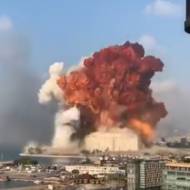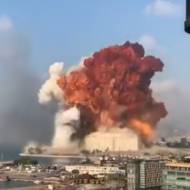
Opinion: What Really Happened at the Port of Beirut?

The author explains why he feels certain that explosives, ammunition, and missile fuel, which are highly volatile and flammable substances, were stored by Hezbollah in the Beirut warehouse after being shipped from Iran.
By Mordechai Kedar, BESA Center
The official report of the Lebanese authorities on the massive August 4 explosion at the Port of Beirut is that a warehouse near the water containing 2,750 tons of ammonium nitrate exploded. They claim that this material had been in the warehouse for over six years, with the approval of the court, and confirmed this claim with documentation.
With all due respect to the Lebanese authorities, I do not buy this story. I believe that explosives, ammunition, and missile fuel (which are highly volatile and flammable substances) were stored by Hezbollah in this warehouse after being shipped from Iran. There are several reasons why I believe this.
There was a series of at least three explosions, each of which had a different result. The first created a gray column of smoke that remained for several minutes. The second, a column of red smoke, also remained for several minutes, while the third created a white mushroom cloud that dissipated within seconds. This suggests that at least three different materials were stored in that warehouse.
Anyone familiar with how a port operates knows that the front row of warehouses, which are closest to the water, are used for short-term storage. Cargo that is meant to be stored long-term is moved to warehouses further away from the water.
Anyone who ships sensitive cargo and does not want it to be seen, photographed, or targeted by others from air, space, or ground tries to hide it as close as possible to the water. The warehouse that exploded was on the water’s edge.
After Israel (according to foreign sources) attacked the warehouses at Damascus Airport several times, Beirut Seaport replaced Damascus Airport as the destination for Hezbollah’s ammunition and explosives imports from Iran. What used to arrive at Damascus Airport by air is now brought to Beirut by ship. For Hezbollah’s purposes, the warehouses at the port of Beirut have replaced the warehouses of Damascus Airport.
What probably happened on August 4 was an explosion of volatile and flammable materials that were incorrectly stored by Hezbollah for at least a day in a metal, non-airconditioned warehouse. As it is midsummer, temperatures are very high. I believe missile-fuel fumes evaporated from a container and touched the hot wall or ceiling, where they ignited and caused a chain reaction of explosions.
Will Nasrallah Suffer ‘Heart Attack’?
Less than an hour after the explosions, Hezbollah announced that the exploded material was ammonium nitrate. Hezbollah was the first to report it. The reason: Hezbollah was looking for a way to cover up its own negligence and establish an official version that deflected attention away from itself, because no one in the government would dare contradict them.
I suspect that very few people in Lebanon buy Hezbollah’s version of the story. I think Hassan Nasrallah is viewed by the Iranians and, indeed, by his own friends in Hezbollah as personally responsible for this disaster. I would not be surprised to hear that he has suffered a “heart attack” and is thus ending his role as Hezbollah’s secretary general. Perhaps the “heart attack” will be fatal.
Lt. Col. (res.) Dr. Mordechai Kedar is a senior research associate at the Begin-Sadat Center for Strategic Studies. He served for 25 years in IDF military intelligence specializing in Syria, Arab political discourse, Arab mass media, Islamic groups, and Israeli Arabs, and is an expert on the Muslim Brotherhood and other Islamist groups.
Note: This is an edited version of a post from the Facebook page of Mordechai Kedar.
HELP ISRAELIS BATTLE CORONA!
Donate to the Corona Emergency Relief Fund. Coronavirus has taken a huge toll on the people of Israel. The poor, elderly and ill are most vulnerable.
Israeli soldiers, security officers and medical care providers operate under great danger and risk to life.
Over 1 million Israelis are out of work. Many cannot make ends meet. We provide financial aid, food, medical supplies and more. Funds are distributed where needed most. The time to act is now!
United with Israel